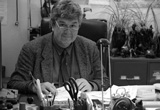 When partnerships break down, money is an expected battleground. One of the most public and fiercely destructive examples is in the disintegrated marriage. Charge and countercharge escalate; then these are translated into monetary forms.
When partnerships break down, money is an expected battleground. One of the most public and fiercely destructive examples is in the disintegrated marriage. Charge and countercharge escalate; then these are translated into monetary forms.
Understanding this translation is crucial to any hope of understanding or containing the human agenda. For money is so often the exchange currency (literally) that expresses other—frequently unarticulated, even unconscious—forms of loss: those of being valued and in relationship. Anger becomes a frequent foil for sorrow: litigation is often obliquely obscured grief.
This process—the expression of degraded relationships in monetary or legal terms—is now commonplace in our NHS. Doctors are complaining increasingly, with great vigour and plausibility, that the quantity of work that is required is insultingly discommensurate with the payment offered. There are threats of strike action—gestures against the professional-governmental marriage. Many simply leave.
But is it the quantity of work or money that is really central to discontent? If not, what is it?
Up until the past two decades most doctors worked longer hours than they do now and the pay was no better than it is now. Very significantly, we willingly accepted much unaccounted and unremunerated out of hours responsibility. Yet the mass of evidence indicates that doctors then liked their work far more than they do now: aggrieved dissatisfaction was sporadic and solitary.
All this indicates that our burgeoning, endemic problems in the NHS workforce are not primarily about working hours or about pay. What, then, is the source of our current fractious discontent?
The answer, I think, is to be found by examining the changed nature of our work, not its quantity.
Healthcare is often difficult and demanding work. Our best efforts are both fired and sustained by meaningful human contact and recognition: these in turn need personal relationships and identifications. Such are the essential nutrients for gratified and resilient healthcarers.
What has happened to these essentials?
Inadvertently—without understanding the complex consequences—our recent serial health reforms have been heedless in abandoning these essentials. Instead, in an effort to assure uniformity and (impossible) fail safety, we have created mandatory systems that replace personally invested professional judgment with depersonalised institutional procedure; familiar practitioners by rotas of anonymous teams; personal understanding by data. The list of culpable devices is very long and indicates the vast and dense bulk of our cultural change: management algorithms, the Quality and Outcomes Framework and appraisal documentation, numerous and simultaneous goals and targets, payment by results, mandatory computer coding, autarkic foundation trusts, psychometry questionnaires . . . This preliminary list may seem diverse but it indicates how widely we have spread our procedural net—how eager some have been to bring a machine like efficiency, a commercial motivation, to our welfare.
So it is that the structure of the factory replaces the ethos of the family.
The consequences have been cumulative, though insidious. Hence the many forms of alienated disaffection that will fatally undermine the many hopeful initiatives of management. What reformers and planners have not recognised is both the power and the delicate complexity of the human heart of welfare: it cannot be satisfactorily replaced by a mechanical one, however well designed, engineered, or inserted.
The only sustainable remedy for our burnout and wearying professional dis-ease is to re-establish ways back to our more natural forms of personal identification, belonging, and fraternalism. For all their faults, our previous systems embraced such things much more successfully. We have much to revisit, review, and retrieve.
This is a formidable task as it will involve the demolition of many of our most vaunted recent management structures. We must face this inconvenient paradox: to re-find a more natural form of efficiency, we need to relinquish many of the recent devices that have been marshalled to enforce “objectivity” and managed efficiency.
Flexibility and trust may carry risk, but excessive management fares far worse—it destroys our healing and creative intelligence and spirit: the natural heart of healthcare.
This growing heart failure in our healthcare is now a major hazard.
David Zigmond is a GP in London.
Competing interests: I declare that I have read and understood BMJ policy on declaration of interests and I have no relevant interests to declare.